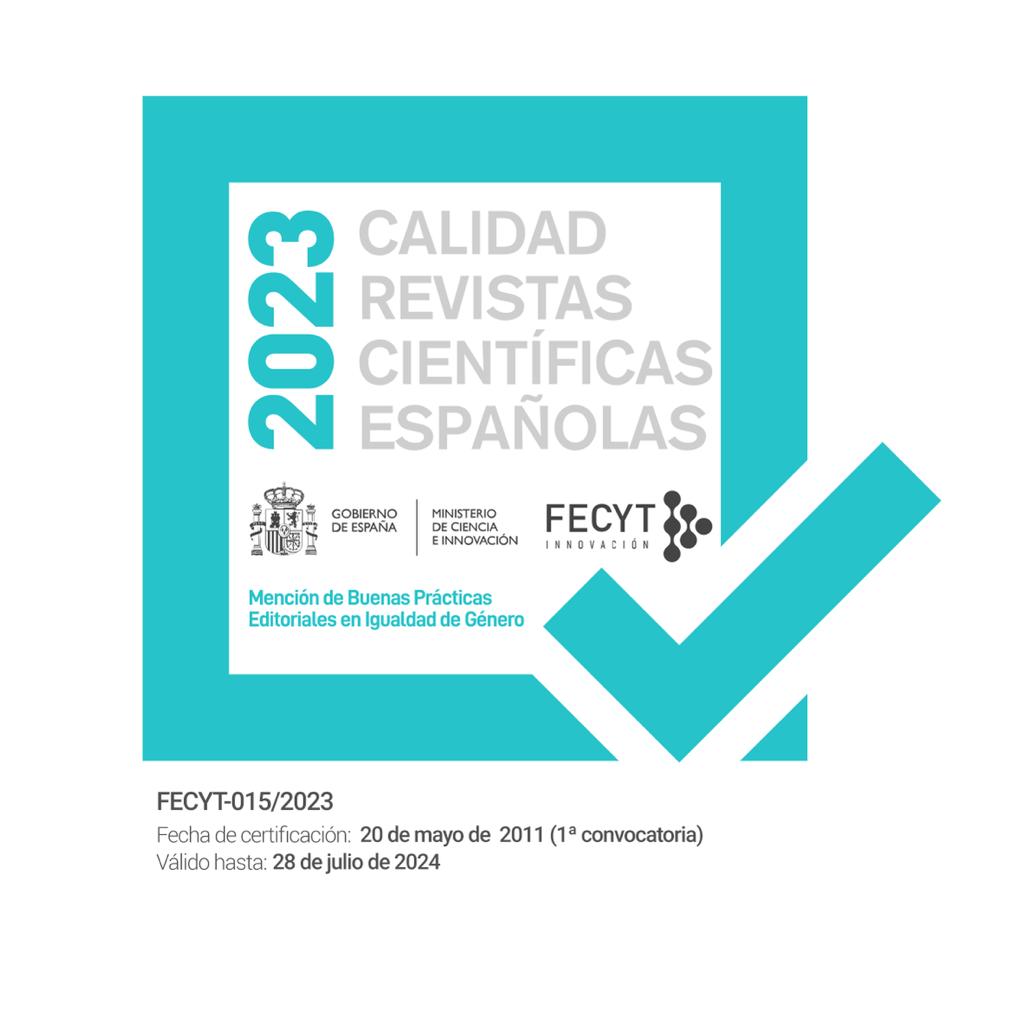Academic engagement and its impact on undergraduate student performance at the University of La Laguna
DOI:
https://doi.org/10.30827/relieve.v27i1.21169Keywords:
Academic engagement, University students, Academic performance, Formative trajectories, Involvement in workAbstract
The attitude and involvement with which undergraduate university students approach their training process can have a significant impact on the academic results they obtain. The relationship that can occur between low involvement and the possibility of failing or dropping out of studies has led us to propose this research, where the relationship between engagement and academic performance is deepened. The engagement refers to the feeling of well-being of the students with respect to a challenge related to their training process. Students who are studying at university are exposed to living situations that make them more or less committed to their learning process, which can lead to obtain better or worse academic results. This ex-post-facto quantitative study, which was carried out with a sample of 564 first and second year students from the three degrees of the Faculty of Education of the University of La Laguna (Spain), aimed to analyze the relationship between academic commitment and performance in studies. The results reveal that students with higher scores in the different structural dimensions of academic commitment (vigor, dedication and absorption) have higher grades in the subjects they take. The discussion of the study focuses on the need to plan strategies to promote academic commitment in order to strengthen both the trajectories of adaptation and permanence in the degree and the achievement of better academic results in university students.
Downloads
References
Álvarez, P. (2014). La función tutorial del profesorado universitario: una nueva competencia de la labor docente en el contexto del EEES. Revista Portuguesa de Pedagogía, 47(2), 85-106. https://doi.org/10.14195/1647-8614_47-2_5
Álvarez-Pérez, P.R., López-Aguilar, D., & Valladares-Hernández, R.A. (2021). La influencia del engagement en las trayectorias formativas de los estudiantes de bachillerato. Estudios Sobre Educación (ESE), 40, 27-50. https://doi.org/10.15581/004.40.27-50
Bastian, M., Heymann, S., & Jacomy, M. (2009). Gephi: an open source software for exploring and manipulating networks. Proceedings Third ICWSM, 8, 361-362. https://gephi.org/publications/gephi-bastian-feb09.pdf
Bethencourt, J., Cabrera, L., Hernández, J., Álvarez, P., & González, M. (2008). Variables psicológicas y educativas en el abandono universitario. Electronic Journal of Research in Educational Psychology, 6(3), 603-622. http://dx.doi.org/10.25115/ejrep.v6i16.1298
Bresó, E., & Gracia, E. (2007). Bienestar psicológico en profesionales y estudiantes universitarios. Un estudio comparativo desde la Psicología Organizacional Positiva. Revista de Psicología Social Aplicada, 17, 23-38. https://dialnet.unirioja.es/servlet/articulo?codigo=2934547
Bresó, E., Schaufeli, W. B., & Salanova, M. (2011). Can a self-efficacy-based intervention decrease burnout, increase engagement, and enhance performance? A quasi-experimental study. Higher Education, 61, 339-355. https://doi.org/10.1007/s10734-010-9334-6
Brigman, G., Wells, C., Webb, L., Villares, E., Carey, J., & Harrington, K. (2015). Psychometric properties and confirmatory factor analysis of the Student Engagement in School Success Skills. Measurement and Evaluation in Counseling and Development, 48(1) 3-14. https://doi.org/10.1177/0748175614544545
Broc, M. (2011). Voluntad para estudiar, regulación del esfuerzo, gestión eficaz del tiempo y rendimiento académico en alumnos universitarios. Revista de Investigación Educativa, 29(1), 171-185. https://revistas.um.es/rie/article/view/110731
Carmona-Halty, M., Schaufeli, W., & Salanova, M. (2017). The Utrecht Work Engagement Scale for Students (UWES–9S): Factorial Validity, Reliability, and Measurement Invariance in a Chilean Sample of Undergraduate University Students. Frontiers in Psychology, 10, 1-5. https://dx.doi.org/10.3389%2Ffpsyg.2019.01017
Casuso-Holgado M., Cuesta A., Moreno N., Labajos M., Barón F., & Vega M. (2013). The association between academic engagement and achievement in health sciences students. BMC Medical Education, 13, 33. https://doi.org/10.1186/1472-6920-13-33
Cho, E., & Kim, S. (2015). Cronbach’s coefficient alpha: Well-known but poorly understood. Organizational Research Methods, 18, 207-230. https://doi.org/10.1177/1094428114555994
Christenson, S., Reschly, A., & Wylie, C. (2012). Handbook of research on student engagement. New York: Springer. https://doi.org/10.1007/978-1-4614-2018-7
Coates, H., & McCormick, A. (Eds.) (2014). Engaging university students: International insights from system-wide studies. Springer. https://doi.org/10.1007/978-981-4585-63-7
Cupani, M. (2012). Análisis de ecuaciones estructurales: conceptos, etapas de desarrollo y un ejemplo de aplicación. Revista Tesis, 1, 186-199. https://revistas.unc.edu.ar/index.php/tesis/article/view/2884
Esteban, M., Bernardo, A., Tuero, E., Cerezo, R., & Núñez, J. (2016). El contexto sí importa: identificación de relaciones entre el abandono de titulación y variables contextuales. European Journal of Education and Psychology, 9, 79-88. https://doi.org/10.30552/ejep.v9i2.140
Faul, F., Erdfelder, E., Lang, A.G., & Buchner, A. (2007). G*Power 3: A flexible statistical power analysis program for the social, behavioral, and biomedical sciences. Behavior Research Methods, 39(2), 175-191. https://doi.org/10.3758/BF03193146
Fonseca, G., & García, F. (2016). Permanencia y abandono de estudios en estudiantes universitarios: un análisis desde la teoría organizacional. Revista de la Educación Superior, 45(179), 25–39. https://doi.org/10.1016/j.resu.2016.06.004
Forteza, J. (1975). Modelo instrumental de las relaciones entre variables motivacionales y rendimiento. Revista de Psicología General y Aplicada, 132, 75-91. http://www.sciepub.com/reference/66035
Fredricks, J. A., Blumenfeld, P., & Paris, A. (2004). School engagement: Potential of the concept, state of the evidence. Review of Educational Research, 74(1), 59-109. https://doi.org/10.3102/00346543074001059
Freixa, M., Llanes, J., & Venceslao, M. (2017). El abandono en el recorrido formativo del estudiante de ADE de la Universidad de Barcelona. Revista de Investigación Educativa, 36(1), 185-202. https://doi.org/10.6018/rie.36.1.278971
García, M.A., Alvarado, J., & Jiménez, A. (2000). La predicción del rendimiento académico: regresión lineal versus regresión logística. Psicothema, 12 (Su2), 248-525. http://www.psicothema.com/psicothema.asp?id=558
George, D., & Mallery, M. (2001). Using SPSS for Windows step by step: a simple guide and reference. Alyin y Bacon.
Gonzáles, G., Castro, A., & González, F. (2008). Perfiles aptitudinales, estilos de pensamiento y rendimiento académico. Anuario de Investigaciones. 15, 35-64. http://www.scielo.org.ar/pdf/anuinv/v15/v15a35.pdf
Guerra, M., Rodríguez, J., & Artiles, J. (2019). Aprendizaje colaborativo: experiencia innovadora en el alumnado universitario. Revista de Estudios y Experiencias en Educación, 18(36), 269- 281. http://www.rexe.cl/ojournal/index.php/rexe/article/view/661
Gutiérrez, M., Tomás, J.-M., & Alberola, S. (2018). Apoyo docente, compromiso académico y satisfacción del alumnado universitario. Estudios Sobre Educación, 35, 535–555. https://doi.org/10.15581/004.35.535-555
Jang, H., Reeve, J., & Deci, E. L. (2010). Engaging students in learning activities: It is not autonomy support or structure but autonomy support and structure. Journal of Educational Psychology, 102(3), 588-600. https://doi.org/10.1037/a0019682
Kahu, E., & Nelson, K. (2017). Participación de los estudiantes en la interfaz educativa: comprensión de los mecanismos del éxito de los estudiantes. Investigación y desarrollo de la educación superior 37(4), 1-14.
Manzano, G. (2002). Burnout y engagement. Relación con el desempeño, madurez profesional y tendencia al abandono de los estudiantes. Revista de Psicología Social, 17(3), 237–249. https://doi.org/10.1174/02134740260372973
Marks, H. (2000). Student engagement in instructional activity: patterns in the elementary, middle, and high school years. American Educational Research Journal, 37(1), 153-184. https://doi.org/10.3102%2F00028312037001153
Martínez, I., & Salanova, M. (2003). Niveles de burnout y engage¬ment en estudiantes universita¬rios. Relación con el desempeño y desarrollo profesional. Revista de Educación, 330, 361-384. https://sede.educacion.gob.es/publiventa/detalle.action?cod=11213
Maslach, C., Schaufeli, W., & Leiter, M. (2001). Job burnout. Annual Review of Psychology, 52, 397-422. https://doi.org/10.1146/annurev.psych.52.1.397
McMillan, J. H., & Schumacher, S. (2005). Investigación educativa: una introducción conceptual. Pearson Educación.
Merino-Tejedor, E., Hontangas, P.M., & Boada-Grau, J. (2016). Career adaptability and its relation to self-regulation, career construction, and academic engagement among Spanish university students. Journal of Vocational Behavior, 93, 92–102. https://doi.org/10.1016/j.jvb.2016.01.005
Moreira, P., Dias, P., Machado, F., & Machado, J. (2013). Predictors of Academic Performance and School Engagement-Integrating persistence, Motivation and study Skills Perspectives Using Person-centered and Variable-centered Approaches. Learning and Individual Differences, 24, 117-125. https://doi.org/10.1016/j.lindif.2012.10.016
Moreno, I., Pedraza, A., & Pineda, C. (2011). Efectividad de las estrategias de retención universitaria: la función del docente. Educación y Educadores, 14(1), 119-135. https://doi.org/10.5294/edu.2011.14.1.7
Muñoz, J.A., & Amón, I. (2013). Técnicas para detección de outliers multivariantes. Revista en Telecomunicaciones e Informática, 3(5), 11-25. https://revistas.upb.edu.co/index.php/telecomunicaciones/article/view/3308
Muñoz, J.F., & Álvarez, E. (2009). Métodos de imputación para el tratamiento de datos faltantes: aplicación mediante R/Splus. Revista de Métodos Cuantitativos para la Economía y la Empresa, 7, 3-30. https://www.upo.es/revistas/index.php/RevMetCuant/article/view/2120
Nerstad C., Richardsen. A., & Martinussen M. (2010). Factorial validity of the Utrecht Work Engagement Scale (UWES) across occupational groups in Norway. Scandinavian Journal of Psychology, 51, 326-33. https://doi.org/10.1111/j.1467-9450.2009.00770.x
Oviedo, H. C., & Campo‐Arias, A. (2005). Aproximación al uso del coeficiente alfa de Cronbach. Revista Colombiana de Psiquiatría, 34(4), 572‐580. Recupreado de https://www.redalyc.org/pdf/806/80634409.pdf
Parra, P. (2010). Relación entre el nivel de engagement y el rendimiento académico teórico/práctico. Revista de Educación en Ciencias Salud, 7(1), 57-63. http://www2.udec.cl/ofem/recs/anteriores/vol712010/revbib71a.pdf
Pena, M., & Extremera, N. (2012). Inteligencia emocional percibida en profesorado de Primaria y su relación con los niveles de burnout e ilusión por el trabajo (engagement). Revista de Educación, 359, 604-627. http://www.revistaeducacion.educacion.es/doi/359_109.pdf
Peters, G.Y. (2014). The alpha and the omega of scale reliability and validity. The European Health Psychologist, 16(2), 56-69. https://www.ehps.net/ehp/index.php/contents/article/view/ehp.v16.i2.p56
Raykov, T., & Marcoulides, G.A. (2017). Thanks Coefficient Alpha, We still ned you! Educational and Psychological Measurement, 79(1), 200-210. https://doi.org/10.1177/0013164417725127
Rodríguez, A., Val, S., & Cortés, A. (2020). Analysis of proactivity in university students and professors. International Journal of Social Policy and Education, 2 (3), 19-28. https://ijspe.com/Journals/201980.pdf
Salanova, M., & Schaufeli, W.B. (2009). El engagement de los empleados. Cuando el trabajo se convierte en pasión. Alianza Editorial.
Salanova, M., Schaufeli, W., Martínez, I., & Bresó, E. (2010). How obstacles and facilitators predict academic performance: the mediating role of study burnout and engagement. Anxiety, Stress y Coping, 23(1), 53-70. https://doi.org/10.1080/10615800802609965
Salanova, M., Schaufeli, W.B., Llorens, S., Peiró, J.M., & Grau, R. (2000). Desde el “burnout” al “engagement”: ¿una nueva perspectiva? Revista de Psicología del Trabajo y de las Organizaciones, 16, 117-134.
Sandoval, M., Mayorga, C., Elgueta, H., Soto, A., Viveros, J., & Riquelmel, S. (2018). Compromiso y motivación escolar: Una discusión conceptual. Revista Educación, 42(2) 2215-2644. https://doi.org/10.15517/revedu.v42i2.23471
Schaufeli, W. B., Martínez, I. M., Pinto, A. M., Salanova, M., & Bakker, A. B. (2002). Bur¬nout and engagement in university students: A cross-national study. Journal of cross-cultural psychology, 33(5), 464-481. https://doi.org/10.1177%2F0022022102033005003
Solaguren, M., & Moreno, L. (2018). Las tutorías académicas en carreras de ingeniería: una visión actual. Revista de Investigación Educativa, 37(1), 251-267. https://doi.org/10.6018/rie.37.1.320931
Tomczak, M., & Tomczak, E. (2014). The need to report effect size estimates revisited. An overview of some recommended measures of effect size. Trends Sport Sciences, 1(21), 19-25. http://tss.awf.poznan.pl/files/3_Trends_Vol21_2014__no1_20.pdf
Truta, C., Parv, L., & Topala, I. (2018). Academic Engagement and Intention to Drop Out: Levers for Sustainability in Higher Education. Sustainability, 10(12), 4637. https://doi.org/10.3390/su10124637
Viladrich, C., Angulo-Brunet, A., & Doval, E. (2017). Un viaje alrededor de alfa y omega para estimar la fiabilidad de consistencia interna. Anales de Psicología, 33(3), 755-782. http://dx.doi.org/10.6018/analesps.33.3.268401
Wang, M. T., & Eccles, J. S. (2013). School context, achievement motivation, and academic engagement: A longitudinal study of school engagement using a multidimensional perspective. Learning and Instruction, 28, 12-23. https://doi.org/10.1016/j.learninstruc.2013.04.002
Weiss, C., Carolan, B., & Baker-Smith, E. (2010). Big school, small school: (Re) testing assumptions about high school size, school engagement and mathematics achievement. Journal of Youth and Adolescence, 39(2), 163-176. https://doi.org/10.1007/s10964-009-9402-3
Xanthopoulou D., Bakker A., Demerouti, E., & Schaufeli, W. (2008). Reciprocal relationships between job resources, personal resources, and work engagement. Journal of Vocational Behavior, 74, 235-44. https://doi.org/10.1016/j.jvb.2008.11.0033

Downloads
Published
How to Cite
Issue
Section
License
Copyright (c) 2021 RELIEVE-Revista Electr´ónica de Investigación y Evaluación Educativa

This work is licensed under a Creative Commons Attribution-NonCommercial 4.0 International License.
The authors grant non-exclusive rights of exploitation of works published to RELIEVE and consent to be distributed under the Creative Commons Attribution-Noncommercial Use 4.0 International License (CC-BY-NC 4.0), which allows third parties to use the published material whenever the authorship of the work and the source of publication is mentioned, and it is used for non-commercial purposes.
The authors can reach other additional and independent contractual agreements, for the non-exclusive distribution of the version of the work published in this journal (for example, by including it in an institutional repository or publishing it in a book), as long as it is clearly stated that the Original source of publication is this magazine.
Authors are encouraged to disseminate their work after it has been published, through the internet (for example, in institutional archives online or on its website) which can generate interesting exchanges and increase work appointments.
The fact of sending your paper to RELIEVE implies that you accept these conditions.
















